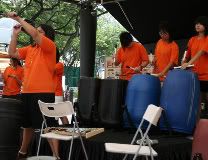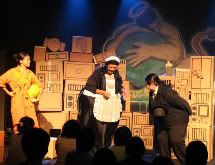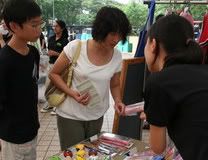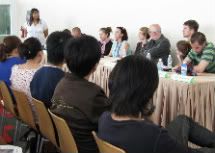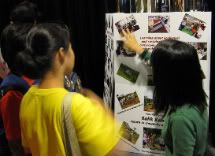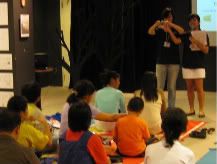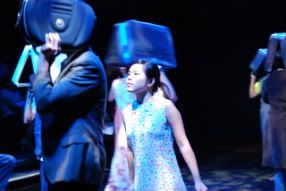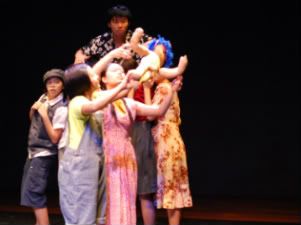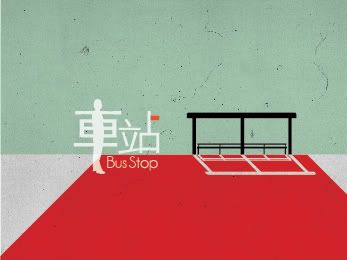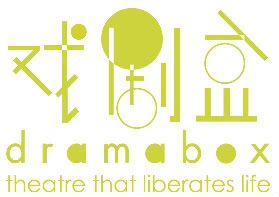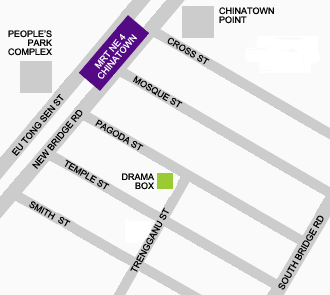2008年5月26日
种----族
参与了“艺树人”在前两个星期五呈现的活动,从中好像更了解自己对于种族关系的想法。1)Race In Schools - SteReotypes And OtheRs
在参与当中的一些游戏时,我很惊奇地发现我们很多人原来在无形中对一些人或一组人持有一些刻板的印象。例如:很多人都认为印族同胞说话时很大声、而且很爱说话还有喜欢为自己的行为辩护。(注:我只是举出一些在活动中出现的情况,并非有心针对任何族群)
经过大家积极地参与和讨论,我听到很多有趣的故事和亲身经历。听着在场的人叙述他们的经历不禁让我盟生一个问题:我们对于其他族群的刻板印象究竟是我们个人的偏见亦或者是有一定的真实?所谓无风不起浪。
当然,尽管我有这样的疑问,我还是不赞成把任何族群定型,更反对用我们持有的刻板印象去看待其他族群的人。我想很多人都很了解并且也知道,什么样的行为是对的、是好的。例如:我们都知道对于其他族群的同胞们必须有一定的敏感度。可是,知道的和真正能够感受的毕竟不完全一样吧。
身为华人,也许我们太习惯属于社会的 majority,因此要忽略少数族群的感受,绝对不是不可能的。
生活中,我也遇过一些让我有所领悟的事情。嗯,例如我认识一个印族同学——我一直没有问她的宗教是什么,而我也在无形中认为她是兴都教的信徒。后来,我终于问她,然而我得到的答案并不如我所想像的。原来,她是回教徒(Indian Muslim)。这个经历让我开始思考我们是不是习惯性地把种族和宗教这两个其实没有任何特定关系的概念联想在一起?我们理所当然认为马来人就是回教徒、印度人就是兴都教徒。然而,我发现我们却没有把华人看成佛教徒啊!为什么我们可以接受并且不事先以为华人是佛教徒,可是对于马来人或印度人却有事先的判断呢?
在活动中,演讲者也提到“name-calling” 这一点。听她提起这一点,我便想起我在学校电梯里听到的一番对话。当时,两名学生在讨论考试成绩。他们说到关于每次考试名列前茅的外国学生时(多数是来自中国和印度的学生),用了两个名称来称呼他们—“Ah Tiong”(中国人) 和“KLK”(Keh Leng Kia/印度人)。的确,我想类似这种不礼貌的名称对我们并不陌生。
最后,我今天到了小印度。那里到处都是印度人,只有一些华人。当下,我能够想像少数族群的朋友平时置身在多数是华人的社会中,有什么感受。我在小印度,虽然和周围的人保持友善的关系,店员也对我很友善,但是在心里深处总是有一点的不安。因为我毕竟离开了我所熟悉的人和文化,而且对于对方的文化我其实并不非常理解。
所以,我想,我们必须时时刻刻提醒自己“种族和谐”这样的情况其实建立在一个极为脆弱的基础上。因为我们扪心自问,我们并没有做到对其他种族的文化等有一定的了解。我们只不过是在相处的层面上,能够维持一定的礼貌和不干涉。那,我们想要的“种族和谐”是不是仅停在这个层面?还是,我们要真的用心去维系种族之间的关系?
Race
During the games and activities, I was surprised to find that most of us actually held similar sets of stereotypes for certain groups of people. For example, many of us felt that Indians are loud, talkative and argumentative. (*Note: For my purpose, I am purely highlighting what happened during the discussion and activities. It is not my intention to deliberately pick on certain groups of people)
I heard many interesting stories from people’s sharing of their experiences. As I listen to their stories and why they come to hold certain sets of stereotypes for particular groups, I started to have a question in my mind: Are the stereotypes that we come to hold about certain groups a result of our narrow-mindedness and prejudice or are they really based on some level of truth?
Naturally, even as I question the level of truth in our stereotypes, I am still against classifying a group of people under “tags” and “stereotypes”. I am even more against judging people who belong to certain groups based on prior stereotypes of the group. I guess many of us understand and are aware of what kind of behaviour is “correct”, what kind of behaviour is “good”. For instance, we know that we ought to be sensitive towards other racial groups. However, what we know and what we truly feel are not exactly the same, are they?
As Chinese, we are perhaps so used to being part of the majority of society that it is not impossible to neglect the feelings of the minority groups of people.
I have had some personal experiences which taught me things about myself and other people. I know an Indian school mate. I never asked her for her religion and I had somehow assumed that she was a Hindu. Finally, I asked her if she was Hindu, and the answer she gave me was beyond what I had expected. I learned that she was an Indian Muslim. This experience I had made me question our tendency to make a false connection between religion and race. We are used to thinking that Malays are Muslims, Indians are Hindus. However, it seems unfair that we have come to accept that not all Chinese are Buddhists but we still cannot seem to do the same for Malays and Indians.
During the talk, the speaker-facilitator mentioned the point on “name-calling”. I recall a conversation I heard in the lift of my school. Two students were discussing about their recent examinations results. When they were on the topic of the foreign scholars who always topped the class, they used terms like “Ah Tiong” (China Scholars) and “KLK (Keh Leng Kia)” (Indians) to address these groups of people. The fact is, such impolite terms are not new to us.
Lastly, I happened to be in Little India today. The place was filled with Indians, with the exception of a few Chinese. At that moment, I can really feel what the Indians and Malays probably feel when they are in the midst of Chinese. Although I had an enjoyable experience with the people at Little India, I still felt insecure sometimes because this was not the environment and culture that I am familiar with, and I also did not know much about their culture.
Hence, I feel that the “racial harmony” that we have in Singapore today is probably built on a rather weak foundation. We most probably know very little regarding the culture and lives of the other racial groups. All that we have managed to do are to maintain cordial relations as well as keeping out of each other’s matters. Then, what is the kind of “racial harmony” that we really wish to have? Do we want to keep on maintaining relations on a superficial level or do we want to go beyond that to really try to understand a different culture from ours?
2008年5月25日
路 一直都在
我感到惭愧。当初,初听闻四川省发生了地震时,原本以为不怎么严重,也不怎么关注。
对于缅甸的风灾,我更是到了灾害发生很久之后才知道它发生过。
面对这样的自己,我感到惭愧。
最近,一直在想自己能够做些什么?
人,面对着自然,从来就是非常渺小的。
生命,更是无比的脆弱。
可是,生命从来就不是应该被放弃的。
即使一个人的力量有限,我还是希望自己能够尽我所能。
我们没有经历过类似的情况,所以我们不可能完全了解其中的痛苦。
但是,我们也不可能不为所动。
看得出我的思绪开始混乱,但是我想大家都明白我要说的是什么。
嗯,以一首陈奕迅的歌《路一直都在》做结尾:
穿过一块里面一片黑暗 没有想过回头
一段又一段走不完的旅程 甚麼时候能习惯
噢 我的 梦代表甚麼 又是甚麼让我们期盼
That's just life 寻找梦里的未来
That's just life 少点现实的无奈
不论风吹的时候 不在傍徨的时候
永远向前 路一直都在
没有选择的时候 无论选择的时候
永远向前 路一直都在
2008年5月24日
Sharing Session with Yeo Yann Yann
hello all!i attended the sharing session with local actress yeo yann yann, organised by Shiju, the i/c of Blanc Space, this afternoon (3-5pm) at dramabox.
so i'm here to share about some of the topics discussed (:
other people present were:
yeo yann yann, shiju, peifen, entia and guoqingliang who couldnt resist the temptation and decided to join us halfway. lol jus kiddin'
anyway, cos its my first time attending a sharing session like this with mostly unfamiliar faces, i was observing and trying to digest the discussion most of the time as it got a bit chim halfway through. the sharing was directed in the perpective of a playwright as the members of Blanc Space are working on their pieces.
topics discussed:
1. what yann yann does everytime she receives a script
- 了解剧本的走向,前因后果,剧本想表达的message,自己在剧本上加注解
- 对手的重要性 :give and take, hitting the feel
- research (prototype), exercises to help find the character via eg. costumes, observe and notice people in the surroundings etc.
-expanding imagination based on info given in the script and coming to a consensus through meetings with director and co-actors
-qingliang also mentioned about 人物的生命脉络 which i half get it and half dont. a bit confusing heh . but it was bascially about shaping the character and bring it to life so that it can CONNECT with the audience. (connecting - allowing audience to recall a common experience, understand and feel for what is happening on stage etc.) perhaps qingliang can help expanding on this if i missed out anything? hehe
2. the authority of an actor vs that of director/playwright
-早早设定工作的框架
-COMMUNICATION
3. the difference between a movie/tv script and a theatre play script
-movie/tv script: 用画面来说故事,fewer lines(usually incomplete), 文字没有那么美, less time to explore the character
-theatre play script: 用舞台和画面/行动来说故事, more lines(complete), 文字比较美,more time to work with character
4. the difference between an english script and a chinese script
-长/短音的分别
this is about all that i've noted down but each topic was actually expanded. it was quite an enriching experience although i still have things on my mind w/o answer. eg. how much are you willing to compromise(eg. working for a production which you find it a waste of resources) in order to earn money etc. hopefully we can have a sharing session next time and we can share our views about different topics !
«Exploring roles and scenes from life and theatre»
7th Theatre Summer Camp – Seminar 2008«Exploring roles and scenes from life and theatre»
Spetses Isl., Greece, 23-29 August 2008
From the 23rd until the 29th of August 2008 the Hellenic Theatre/Drama & Education Network is organising the 7th Theatre Summer Camp-Seminar on Spetses Isl., Greece, entitled “Exploring roles and scenes from life and theatre”.
In the friendly and relaxing environment of Anargyreios School by the seaside educators, actors, theatrologists, and students of Theater and Education will have the opportunity to explore the multiple functions of theatre/drama as an art form and a learning medium.
The Theatre Camp includes 3 workshops, and opportunities for exercise, swimming, relaxation and fun. On the last evening of the Camp the participants of the Workshops will present and share parts of their work and join the farewell party.
More information on the programme, workshops, the application procedure (electronically), cost etc on the website www.TheatroEdu.gr
or click http://www.theatroedu.gr/main/index.php?option=com_content&task=view&id=1358&Itemid=391
ORGANIZED BY: Hellenic Theatre/Drama & Education Network
Info. 00302106541600, 00302610342991, 00306972267716
Email: theatro@theatroedu.gr, info@theatroedu.gr
Adm.: tel. 00302106541600
------------------------------------------
Πανελλήνιο ΔΙΚΤΥΟ για το ΘΕΑΤΡΟ στην ΕΚΠΑΙΔΕΥΣΗ
HELLENIC THEATRE/DRAMA & EDUCATION NETWORK
member of IDEA -International Drama/Theatre & Education Association
Athens, Greece
Email: theatro@theatroedu.gr, info@theatroedu.gr
WebPage: www.TheatroEdu.gr
2008年5月22日
What Matters? Fringe #2: Free Movie Screening - To Kill a Mockingbird
Click on the image to view an enlarged version
2008年5月14日
What Matters? fringe #1 is happening this Friday!
Fringe #1 Race in School - Stereotypes and OthersDate/Time: 16th May, this fri, 7:00pm-9:30pm
Venue: *Scape (Opposite cineleisure)

Limited seats available, BOOK NOW via admin.ARTivate@gmail.com
or call Drama Box at 6324 5434
2008年5月8日
WHAT MATTERS?
do click on the picture for more informationlimited places for each event, so do register soon!

2008年5月6日
What Matters?
ARTivate presents: What Matters?What Matters? is a package of 1 forum theatre play and 3 fringe activities which explores the issue of race with the youths of today. What Matters? aims to provide a whole new perspective on racial harmony locally and globally.
What Matters? – A forum theatre play
Brought to you by ARTivate, in collaboration with Esplanade - Theatres on the Bay, with support from the National Arts Council as part of the NAC School Arts Excursion Programme.
What Matters? is a forum theatre play which explores the difficult issue of racial disharmony with youths of today. The forum session of the play also turns spectators to active spec-actors!
Date and Time: 2-4 July, 3pm & 4pm
Venue: Esplanade Theatre Studio
Ticket price: $20 (excluding $1 Sistic charge)
(Schools are eligible for the 60% TOTE Board Arts Grant Subsidy)
Tickets on sale now! Book online via the FYI: Feed Your Imagination webpage, or contact pluanne@esplanade.com)
*Performed mainly in English with some Mandarin and Malay (English Surtitles provided).
Fringe #1: Race in School – Stereotypes and Others
Conducted by senior researcher and trainer, Dr. Lai Ah Eng and Farid Hamid, the session will help youths to think through racial issues. The youths will be encouraged to move, play and think, thus finding the way of dealing with racial issues in real life.
Date and time: 16th May, Fri, 7pm-9:30pm
Speaker & facilitator: Dr. Lai Ah Eng & Mr. Farid Hamid, of ITHACA
Venue: *scape Youth Centre (Lab)
Fringe #2: Movie Screening – To Kill a Mockingbird
Based on the novel by Harper Lee, this award-winning classic film will present racial issues vividly on screen! There will also be a discussion session after the screening.
Date/Time: 23rd May, Fri, 6pm-8:30pm, 8:30-11pm
Venue: *scape Youth Centre (Lab)
Facilitator: Danny Yeo 杨君伟
Fringe #3: Surviving Ethnic Conflicts in Bosnia – a Singapore Arts Fest programme
Young actors of Class Enemy from Bosnia will share with us their personal experiences of the war-torn times and how they have learnt to cope with growing up in an environment filled with violence caused by racial and ethnic conflicts. With Singapore having the same multiethnic context, the talk will be a great learning platform of dialogues between youths of both countries.
Speaker: Director Haris Pasovic and the cast of CLASS ENEMY (East West Theatre Company)
Date/Time: 20th June, 2pm – 3.30pm
Venue: Drama Centre Visitor Centre @ NLB
FREE ADMISSION to all fringe events! limited 100 seats on a first-come-first-served basis!
BOOK NOW: admin.artivate@gmail.com


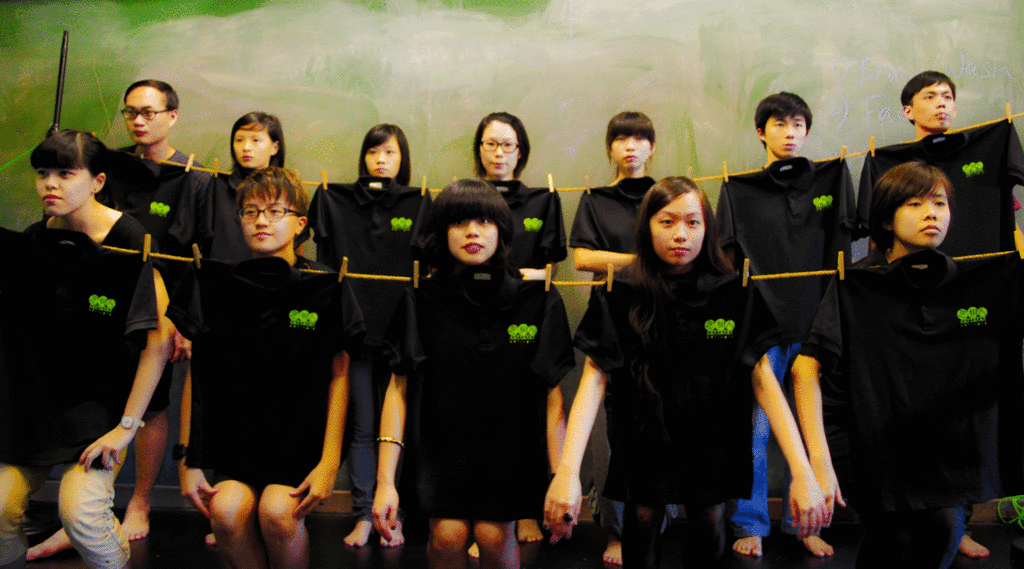
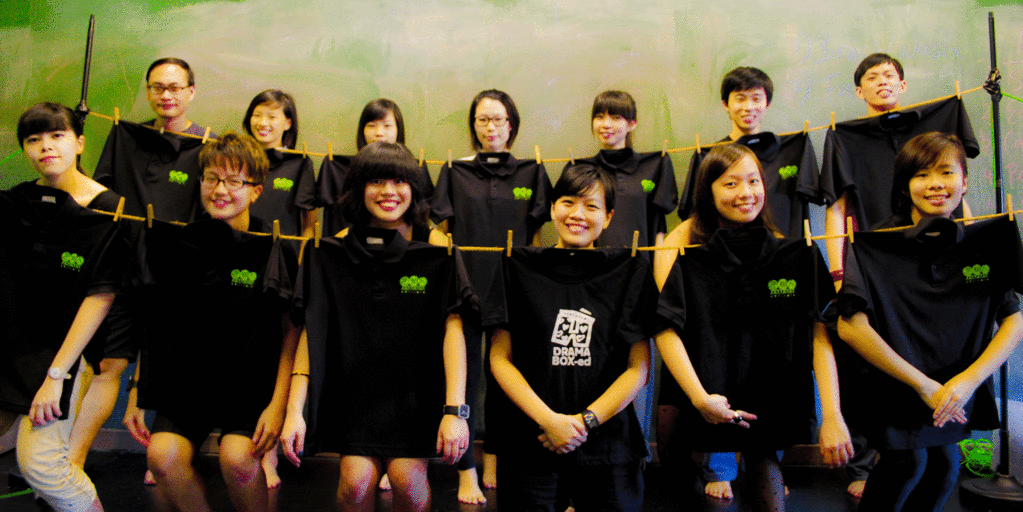
 母性泛滥; 热爱人
母性泛滥; 热爱人 长着翅膀
长着翅膀 我在南大念心理学科。心理学对我来说,跟戏剧的妙处不相上下。
我在南大念心理学科。心理学对我来说,跟戏剧的妙处不相上下。 就读南洋理工大学。
就读南洋理工大学。 法律系学生。
法律系学生。 正值后青春期的门槛状态。
正值后青春期的门槛状态。 热爱的东西太多,拥有的时间有限。
热爱的东西太多,拥有的时间有限。 在国大读书.
在国大读书. 南大中文系毕业。非常健忘,经常丢三落四。
南大中文系毕业。非常健忘,经常丢三落四。 在2009年毕业于新加坡国立大学的科学系。由于我目前还在学习编剧和导戏的工作,未能有值得一提的代表作。
在2009年毕业于新加坡国立大学的科学系。由于我目前还在学习编剧和导戏的工作,未能有值得一提的代表作。 爱与剧场牵手,与社会学接吻。
爱与剧场牵手,与社会学接吻。 艺树人面试那一天,我告诉许慧铃:"其实我想要做的是电影。"
艺树人面试那一天,我告诉许慧铃:"其实我想要做的是电影。" 